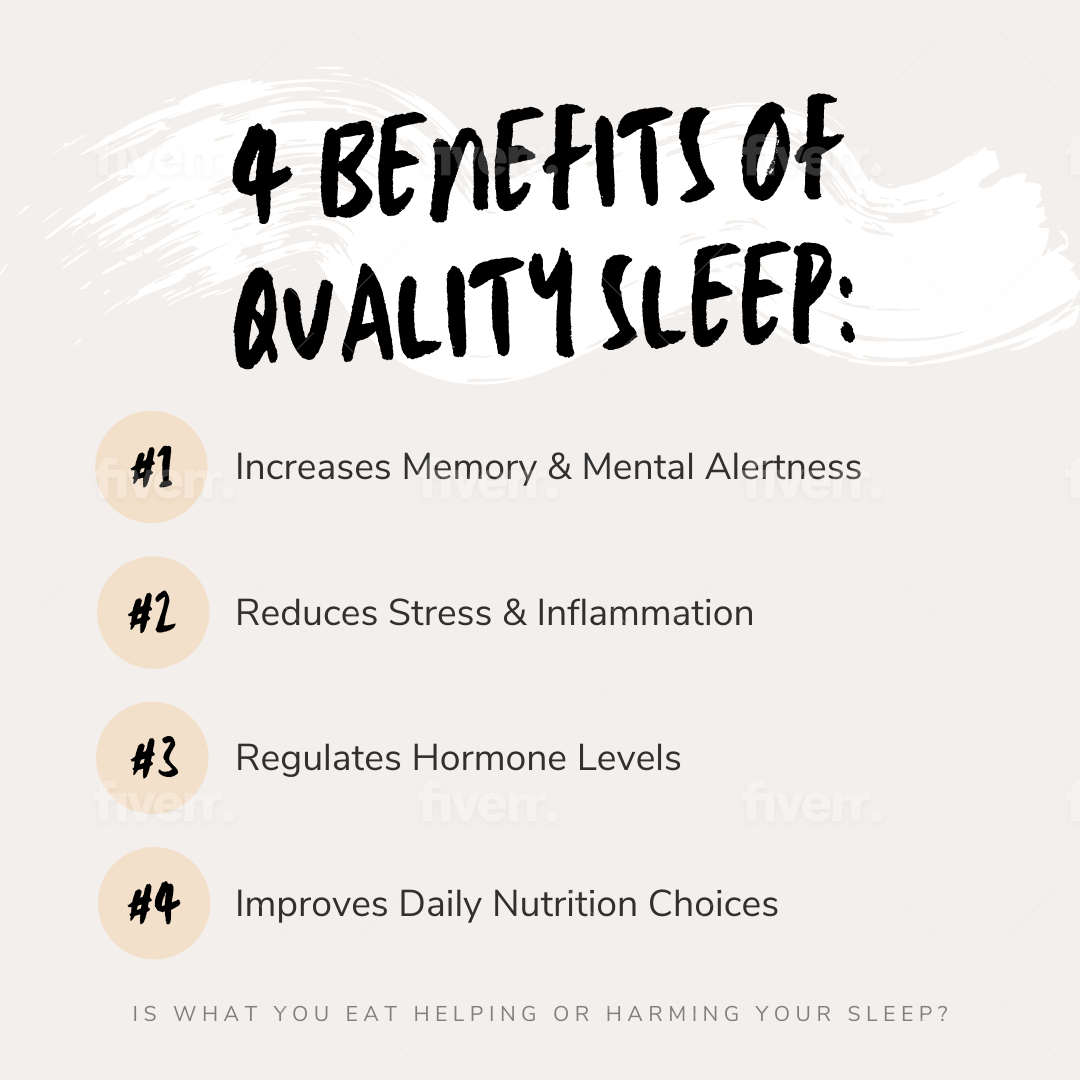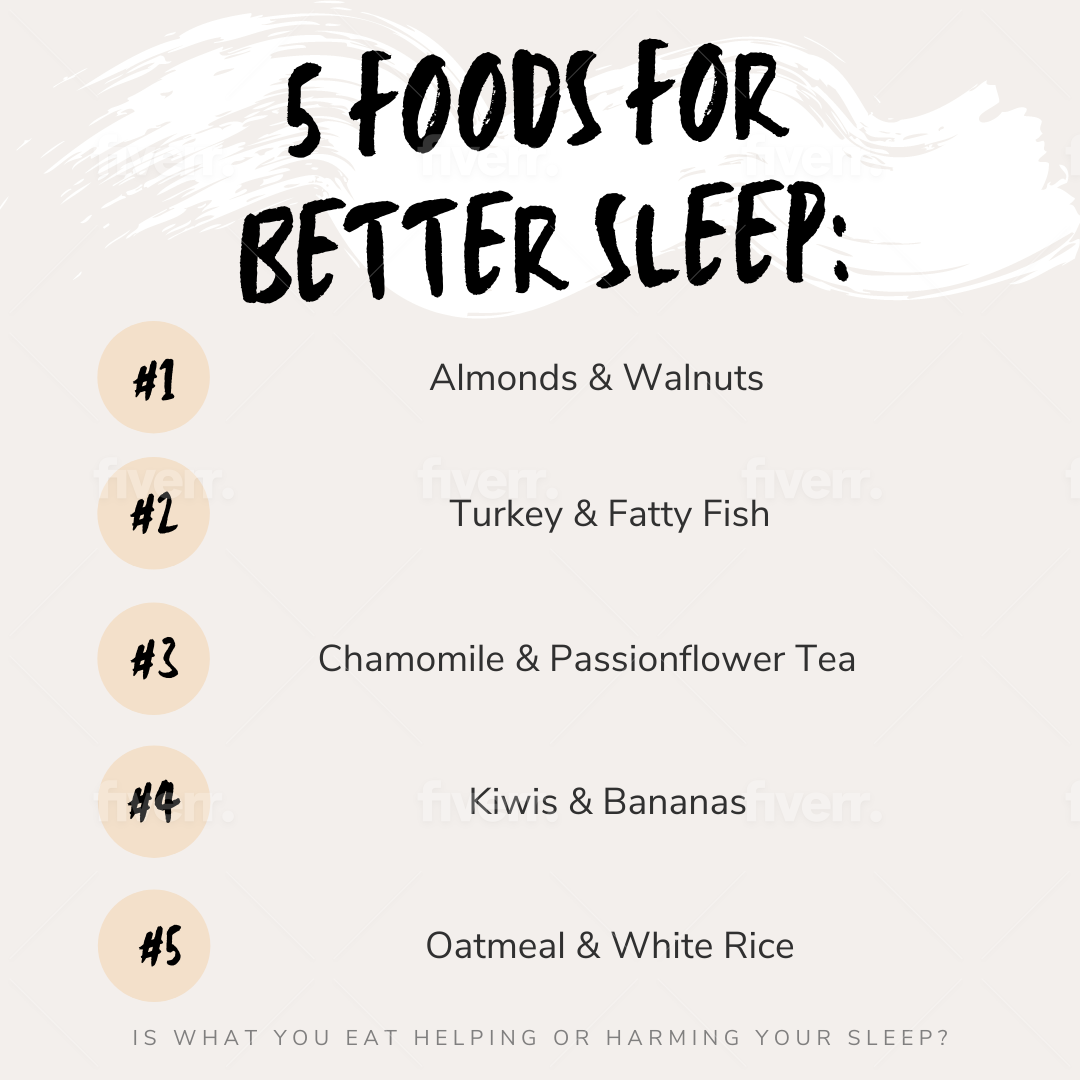Our sleep quality depends on more than the hours our eyes are closed. Everything from how much we exercise and the time we spend outside to how often we look at our phones and the stress we put ourselves under affect our sleep. And one of the most important factors to our nightly sleep quality is the combination of foods and drinks we decide to fuel our bodies with on a daily basis.
But, Why Do We Need Sleep In the First Place?
In order for our bodies to operate at its highest level, we need a balance of exercise, food, and regular sleep. These three facets of life help to create the foundation for long-term health and well-being. They’re intertwined together, each supporting or draining the other. For example, a healthy diet can help us fall asleep fast, enhance sleep quality and duration, while getting consistent high-quality sleep can actually help us eat better.
Research shows poor sleep patterns correlate to eating more overall with worse diet quality, leading to higher rates of obesity and metabolic diseases. While psychological factors contribute to these problems — after all, a sleepy decision is hardly a well-thought-out one — metabolic processes, like fluctuating hormone levels, also play a role.
Here’s What Happens When We Sleep
Scientists used to think that people were physically and mentally inactive during sleep. But that’s not quite the case. All night long, our bodies and brains do quite a bit of work to support our health. There are two main types of sleep: REM (rapid eye movement) and non-REM sleep.
Deep, non-REM sleep lowers our pulse and blood pressure, giving our heart and blood vessels a chance to rest and recover. This allows blood (and the nutrients it carries) to travel faster and more efficiently to the muscles, bones, and organs that need it. During deep sleep, our bodies are able to repair muscle, organs, and other cells.
As well, chemicals that strengthen our immune system start to circulate in the blood. When young and healthy, we spend about a fifth of our night’s sleep in this restorative state. But as we age, that starts to fade, meaning we need more quality sleep to receive those same benefits.
REM sleep, on the other hand, helps your brain clear out the information you don’t need. People who take a look at a hard puzzle solve it more easily after they sleep than before. Those deprived of REM lose this advantage. And while our bodies try to make up this lack of REM sleep in the following nights, constant lack of sleep deteriorates our brain’s ability to function at its peak.
Remember those metabolic processes we touched on earlier? Well, here’s how sleep affects them. See, our bodies regulate certain hormones while we sleep. For example, levels of growth hormone go up, and cortisol goes down. In addition, a lack of sleep can throw the hormones that control hunger — leptin and ghrelin — out of balance, causing us to overeat or hold onto unwanted weight.

How Foods Affect Our Sleep
According to Ana Krieger, MD, MPH, Medical Director of the Center for Sleep Medicine at New York-Presbyterian and Weill Cornell Medicine, our bodies are better equipped to absorb proper nutrients when well-rested and vice versa. “The nutrients we get from food serve as the building blocks for other minerals and proteins that are needed to create the amino acids that are involved in sleep,” she says.
So, when choosing our next meal, especially as our bedtime approaches, it’s best to choose healthy, light foods that will promote our ability to fall asleep and stay asleep… increasing our overall well-being.
Which Foods to Eat Before Bed
While definitive research is still needed, there are some foods for which preliminary studies have found to promote sleep and sleep quality.
1. Almonds & Walnuts
Almonds are a source of the hormone melatonin. Melatonin acts as a neurotransmitter to regulate our internal clock and signals sleep. As well, almonds are an excellent source of magnesium, which may help improve sleep quality by reducing levels of the stress hormone cortisol, which is known to interrupt sleep.
Some researchers claim that eating walnuts improves sleep quality, for their melatonin and fatty acid profile. The fatty acid alpha-linolenic acid (ALA) is an omega-3 fatty acid that’s converted to DHA in the body, which helps to increase serotonin (a sleep-regulating hormone) production.
2. Turkey & Fatty Fish
Turkey has a few properties that explain why some people become tired after eating it, most notably, the amino acid tryptophan, which increases the production of melatonin. As well, there’s evidence that consuming moderate amounts of protein before bed is associated with better sleep quality, including less waking up throughout the night.
Fatty fish, on the other hand, are high in healthy omega-3 fatty acids, specifically eicosapentaenoic acid (EPA) and docosahexaenoic acid (DHA). The combination of EPA, DPA, and vitamin D in fatty fish has the potential to enhance sleep quality, as both have been shown to increase the production of serotonin, another brain chemical that helps regulate your sleep cycle.
3. Chamomile & Passionflower Tea
There’s also some evidence that drinking chamomile tea may boost your immune system, reduce anxiety and depression, and improve sleep quality. Specifically, chamomile tea contains apigenin. This antioxidant binds to certain receptors in your brain that may promote sleepiness and reduce insomnia.
While passionflower also includes apigenin, there’s also some evidence that passionflower increases the production of the brain chemical gamma-aminobutyric acid (GABA). GABA works to inhibit other brain chemicals that induce stress, such as glutamate.
4. Kiwis & Bananas
Eating kiwis may benefit our digestive health, reduce inflammation, and lower your cholesterol, thanks to the high amounts of fiber and carotenoid antioxidants that they provide. According to studies on their potential to improve sleep quality, kiwis may also be one of the best foods to eat before bed.
Another favorite fruit, bananas, also fall into this sleep-promoting category. Banana peels contain tryptophan and the fruit itself is a modest source of magnesium. Both of these properties may help us sleep better.
5. Oatmeal & White Rice
Oatmeal is high in carbs with a bit more fiber than white rice and has been reported to induce drowsiness as well as increasing melatonin production. It’s been suggested that eating foods such as oatmeal, at least 1 hour before bed may help improve sleep quality.
White rice’s carb content and lack of fiber contribute to its high glycemic index (GI). The glycemic index is a measure of how quickly a food increases your blood sugar. This sudden spike and fall may help individuals fall asleep faster.

While the foods listed above provide great nutrition for sleep, other foods can actually cause trouble sleeping. Foods that can interfere with sleep include high-sugar, heavily-processed foods. As well, drinks that include caffeine and alcohol can throw off our sleep cycles. Limit caffeine intake, especially in the afternoon or evening, and avoid alcohol and heavy meals about 2-4 hours before bed to reduce the effects.
Additional Steps to Increase Sleep Quality
Our sleep environment and daily routines, known collectively as sleep hygiene, play a critical role in our ability to sleep well. While some foods may help with sleep in general, they are less likely to be effective if we have poor sleep hygiene.
For example, noisy and bright bedrooms may suppress our body’s melatonin production and counteract the benefits of sleep-promoting food. Review your current sleep hygiene practices to help boost the benefits of these foods for sleep.
Using Sound and Music to Help You Sleep
Calm Radio offers many online sleep music channels that can enhance your sleep patterns. Calm Radio's Sleep music channel, Deeper Sleeper and Sleep Hotel offer extremely soft ambient musical textures that are cyclic repetitive and hypnotic sleep-inducing channels. ASMR Nature Sounds like Beach Waves, River Rain are also preferred by thousands due to their rhythmic hypnotic pulses which are also extremely effective as noise-blockers and sleep-aids. Try using sleep music and ASMR nature sounds for sleep. The results will surprise you.
Happy listening!




